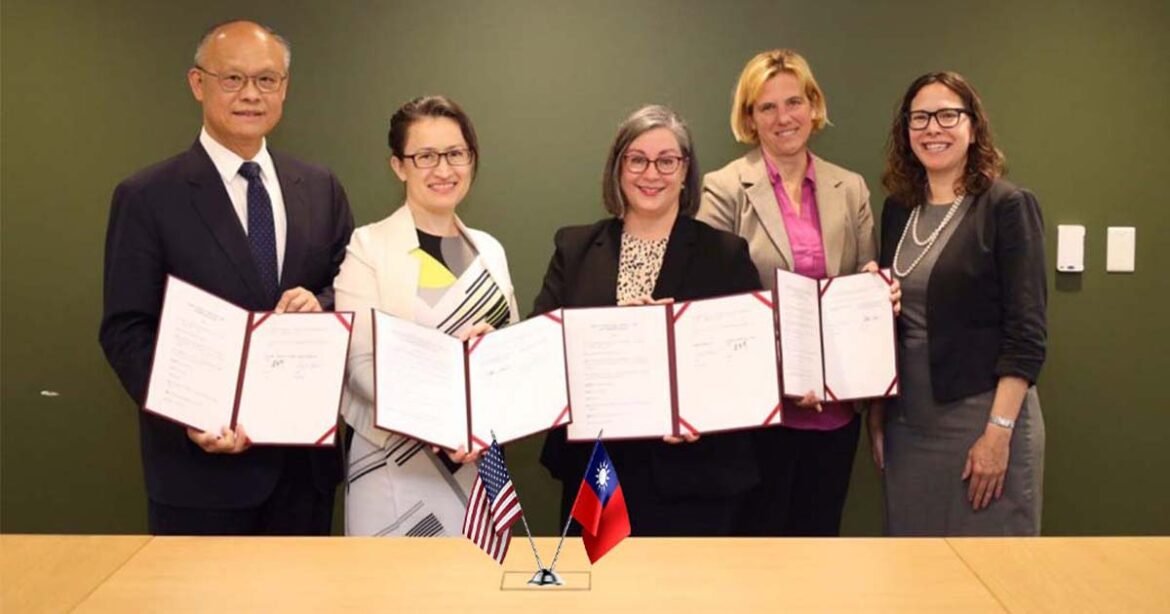In a significant move aimed at strengthening economic ties, the United States and Taiwan have recently signed a trade deal, drawing attention and concern from Beijing. Described by Taiwan’s government as the most comprehensive trade agreement with the US since 1979, this pact seeks to enhance and deepen the economic and trade relationship between the two sides.
You can also read: Biden and McCarthy reach “in principle” agreement on US debt ceiling
Sam Michel, spokesperson at the US Trade Representative press office, stated that the agreement, known as the US-Taiwan Initiative on 21st Century Trade, aims to streamline customs checks, improve regulatory procedures, and establish anti-corruption measures between the US and Taiwan.
Trade deal to deepen economic relations
During the signing ceremony for the inaugural agreement under the US-Taiwan Initiative on 21st Century Trade, representatives from the American Institute in Taiwan and the Taipei Economic and Cultural Representative Office in the United States were present, as confirmed by the USTR press office. Deputy US Trade Representative Sarah Bianchi attended the ceremony, expressing gratitude to Taiwan for their collaboration and emphasizing the importance of this milestone. Furthermore, Michel mentioned that negotiations on additional trade areas outlined in the initiative’s negotiating mandate would follow in the future.
Despite the absence of official diplomatic relations, Washington and Taipei maintain unofficial ties through the de facto US embassy on the island, the American Institute in Taiwan. The United States has been a longstanding ally and major arms supplier to Taiwan, even after shifting diplomatic recognition from Taipei to Beijing in 1979. Additionally, the US stands as Taiwan’s second-largest trade partner. However, Beijing strongly opposes any form of diplomatic relations between Taiwan and other governments due to its claim that the self-ruled island is part of its territory.
Ahead of the signing ceremony in the US, Taiwan’s cabinet spokesperson, Alan Lin, expressed optimism about the historic significance of the trade deal. Lin highlighted that while certain tasks are yet to be completed, Taiwan remains committed to moving towards a comprehensive free trade agreement (FTA) with the United States, ensuring Taiwan’s economic security.
China warns against trade pact
On Thursday, China issued a warning to Washington, cautioning against signing any trade agreement that carries implications of sovereignty or official recognition with Taiwan, which it considers as part of its territory. During a media briefing, Mao Ning, a spokesperson for China’s foreign ministry, emphasized that the United States should not send misleading signals to Taiwan independence forces under the guise of trade.
China has been escalating threats and employing aggressive rhetoric towards Taiwan in recent years, conducting military drills in the waters surrounding the island and attempting to sever its official ties with nations across the globe. This issue has garnered rare bipartisan agreement in the United States, with politicians like Republican House Speaker Kevin McCarthy and his Democratic predecessor Nancy Pelosi publicly meeting with Taiwanese leader Tsai Ing-wen.
In a display of support, Washington unveiled plans for trade negotiations with Taiwan in August, coinciding with China’s large-scale military drills conducted in response to Speaker Pelosi’s visit to Taipei the previous year. China strongly opposes any diplomatic actions that treat Taiwan as a sovereign nation and has responded with increasing anger to visits by Western politicians.
In April, Beijing conducted three days of military exercises, simulating a blockade of Taiwan, in direct response to the meeting between Speaker McCarthy and President Tsai in California.
China’s vehement reaction to any perceived recognition of Taiwan as an independent nation underscores the sensitive nature of the Taiwan issue and the complexities involved in international relations with regards to Taiwan. The signing of a trade pact between the United States and Taiwan has further exacerbated tensions between Washington and Beijing, highlighting the ongoing struggle over the status of Taiwan.
The Chinese foreign ministry has accused Washington of breaching agreements pertaining to the status of Taiwan, which had separated from the mainland in 1949 following a civil war. Despite the absence of official diplomatic relations, the United States maintains substantial informal connections and participates in extensive annual trade amounting to billions of dollars with Taiwan. Mao Ning urged the United States to discontinue all official exchanges with Taiwan, refrain from negotiating agreements that carry sovereign implications or official nature, and avoid sending misleading signals to “Taiwan independence” secessionist forces.
Taiwan has always been a distinct entity separate from the People’s Republic of China. However, the ruling Communist Party in mainland China maintains that Taiwan is obliged to reunify with China, even if it requires the use of force. Beijing has made threats of military action in response to any formal declaration of independence by Taiwan or any delays in unification talks.
As per American and Taiwanese officials, the U.S.-Taiwan Initiative on 21st-Century Trade has the objective of enhancing trade by simplifying customs procedures, investment regulations, and other rules. The signing ceremony is expected to involve representatives from unofficial entities that serve as representatives of the two governments, with the attendance of trade officials from both sides, as stated by the Taiwanese government.


